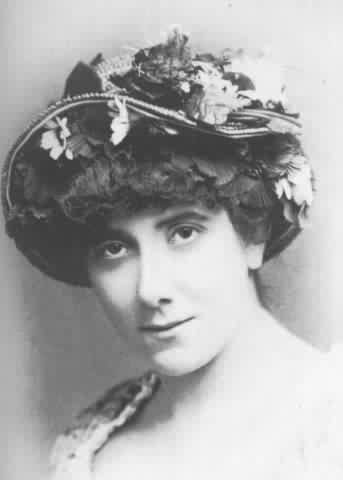|
|
|
 |
Leonora Braham joined the company in 1881 and created the chief soprano part in each of the operas from "Patience" to "Ruddigore". Leonora Braham came to the Company with - unusually if not uniquely - the experience of having played in two of Gilbert's non-Sullivan works, and her reign as D'Oyly Carte prima donna coincided almost exactly with Durward Lely's reign as leading tenor.
Her most remembered role was undoubtedly Yum-Yum in "The Mikado". But, equally undoubtedly, her greatest triumph had come previously, with "Princess Ida". Initially cast as the second soprano in this opera, Lady Psyche, she eventually found herself playing the title- role when the original choice for the part, an American called Lillian Russell, got on the wrong side of Gilbert and was sent packing during the rehearsal period. The role of Princess Ida is, in G. & S. terms, particularly demanding, and Lillian Russell would not be the last "outsider" in D'Oyly Carte history to be brought in to sing it. But Leonora Braham, even if theoretically more at home in the lighter roles of Patience and Phyllis, coped with its demands well, not only in the vocal sense but equally in the way she handled the part as an actress. The "charming delivery" of her exceptionally long opening speech, declared the Era critic after her first performance, had "elocutionary merit of a very high class. Every syllable told," he went on, "and the variety of tone and expression made this speech one of the great hits of the night."
That was her public persona. But as an indication that the public by no means sees, or even gets to hear about, everything that goes on in any theatrical organisation, she came to be regarded with very mixed feelings by D'Oyly Carte himself. She had, first of all, a drink problem. "Dear Miss Braham," Carte wrote to her in July 1885 that is, early in The Mikado run,
"it appears that you were, the night before last, under the influence of stimulants, and that your performance suffered in consequence. I thought that this had been put an end to. . . If you do not discontinue this course, you will certainly lose your [Company] engagement."
And if there was a danger of her losing her engagement through drink, there was also a danger of her losing it for a more orthodox reason. During the summer of 1886 she got married to J. Duncan Young. By early 1887 that is, shortly into the run of "Ruddigore" - a baby was on the way. Which ought to have been a cause for congratulations. But she had initially kept her marriage a secret, and had then sprung this further news without any prior warning; the result being that Carte was as much put out over the question of whether to take her back after her confinement as he had previously been over the problems caused by her addiction to alcohol.
| Artist Index | Main Index |